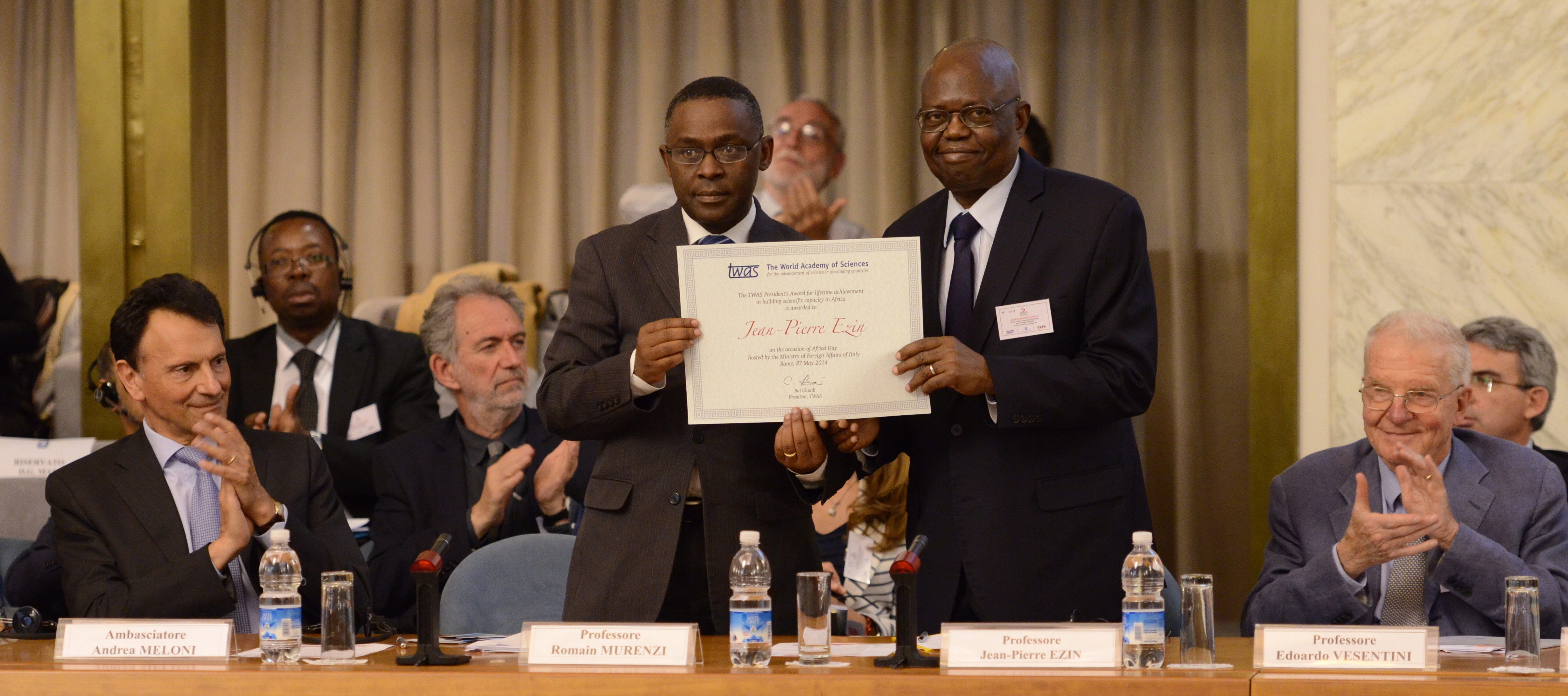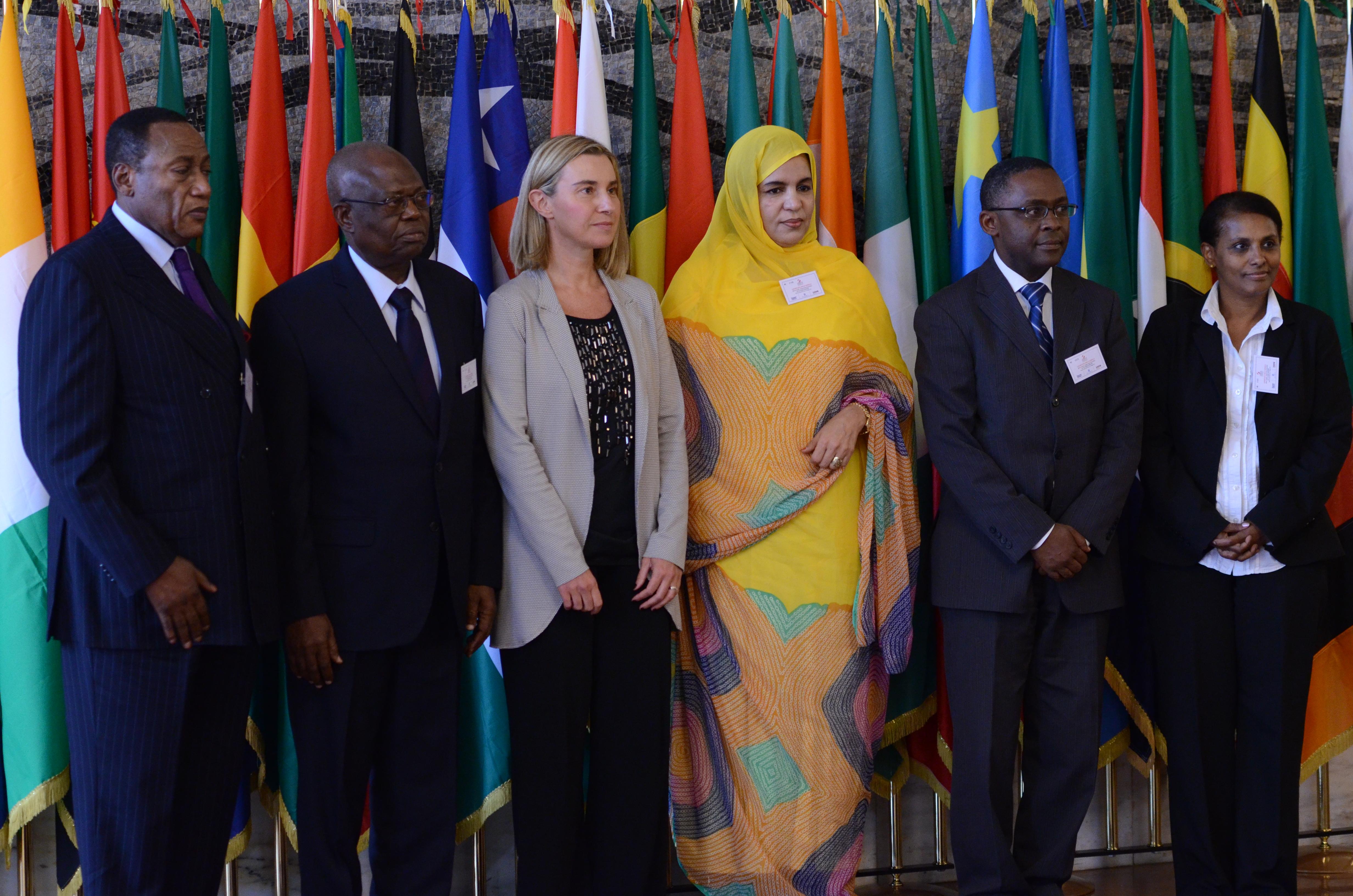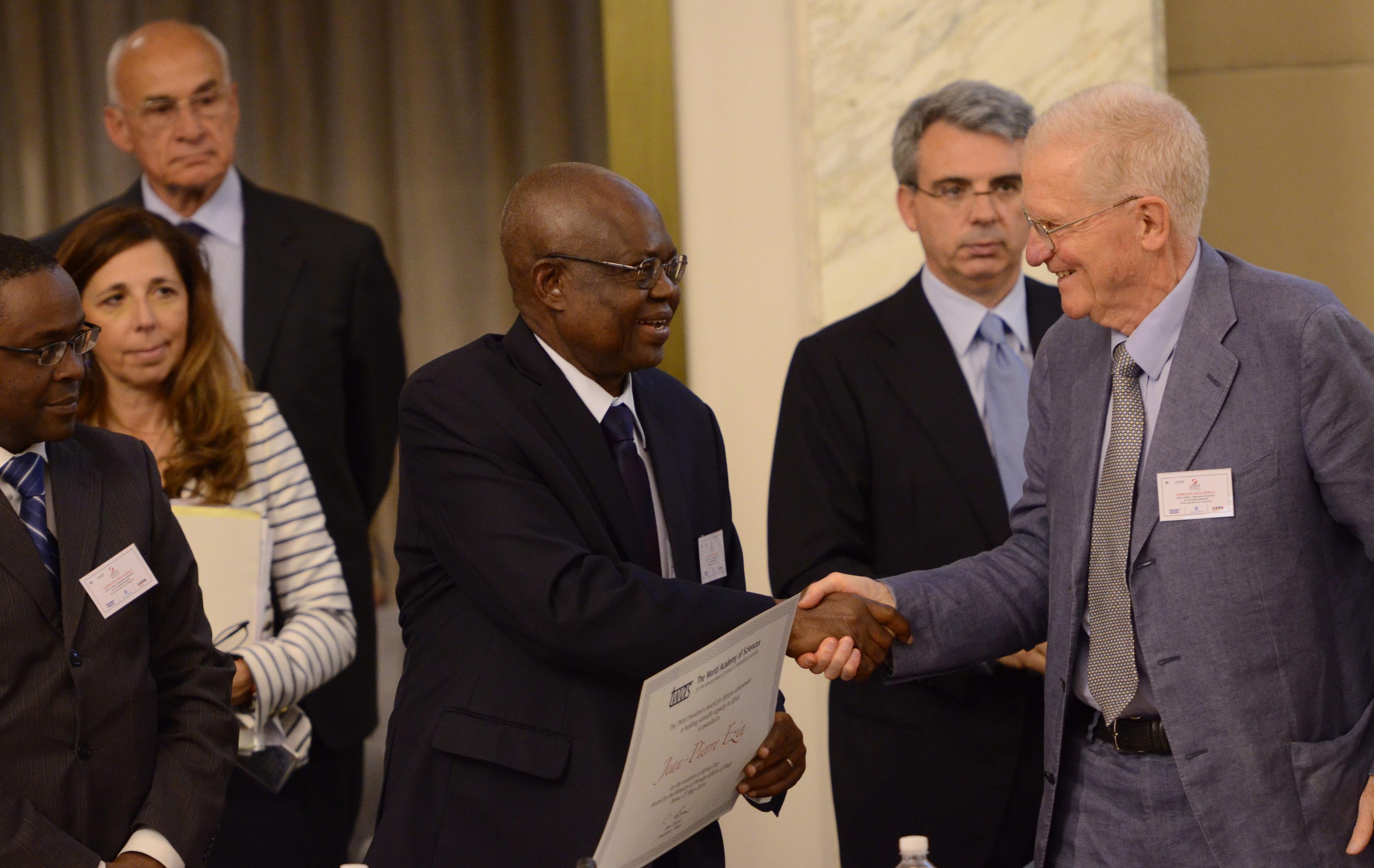
ROME, Italy – Jean-Pierre Ezin, the founder of a respected Benin mathematics institute and now a high-level science policymaker, was honoured by TWAS during the 2014 Africa-Italy Day for lifetime achievement in building Africa's scientific capacity.
Ezin's contributions were recognized with the TWAS President's Award, in a ceremony before an elite audience that included government ministers, ambassadors and diplomats from Italy and throughout Africa. He was given a sustained standing ovation after receiving the award from TWAS Executive Director Romain Murenzi.
Ezin is the founder of the Institut de Mathématiques et de Sciences Physiques (IMSP) at the Université d’Abomey-Calavi in Benin, and still serves as a professor there. He also is commissioner for Education, Science and Culture in the Economic Community of West African States, based in Abuja, Nigeria. He was elected a TWAS Fellow in 2009.
Murenzi praised Ezin's work in advancing science, nurturing new generations of mathematicians and building close ties between Italy and Africa.
"Prof. Ezin has earned enormous respect among mathematicians and scientists in Africa, Italy and many other parts of the world," Murenzi said. "As a scholar and a policymaker, he has spent a career focused on building the strength of African science and related fields. Because of his skill and commitment, he has inspired many others to pursue this same goal."
In a speech after receiving the award, Ezin praised the role of Italy in supporting science in Africa and the developing world. He traced that important relationship to Abdus Salam, the Pakistani physicist who led efforts to create the International Centre for Theoretical Physics (ICTP) 50 years ago, and TWAS in 1983. Both are located in Trieste, Italy.
"If we add to ICTP and TWAS the other scientific centres and institutions that are based in Trieste and focused on the developing world – and which are financed in large part by Italy – we can say that Trieste deserves to be called the world capital for the advancement of science in the developing world," Ezin said.
Africa-Italy Day 2014 convened on 27 May under the theme, "Africa and Italy: Scientific Cooperation for Sustainable Development". The event was held at Rome's Farnesina Palace, the official seat of Italian Ministry of Foreign Affairs (Ministero degli affari esteri, or MAE). The Ministry has long provided important support to and collaboration with TWAS to advance science, engineering and innovation in Africa.
The event was attended by top MAE officials: Foreign Minister Federica Mogherini; Secretary-General Michele Valensise; Undersecretary Mario Giro; and Minister Roberto Cantone, director of the Bilateral and Multilateral Scientific and Technological Cooperation Unit. In addition, the event was attended by top African diplomats in Italy, along with leading officials from United Nations agencies, educational institutions and non-governmental organizations.
At the start of his speech, Ezin recognized the important role of his parents when he was growing up in Benin, a Francophone nation in West Africa. Though they could not read or write, he said, their vision and commitment to education were essential to his own success. He earned his PhD in France, and while based at ICTP as a postdoctoral researcher in the mid-1980s, he had a fateful meeting with Abdus Salam.
Salam offered funds that would allow Ezin to set up an independent centre for math and physical sciences in Benin, and that led to the creation of IMSP. With Ezin serving as its first director, the first class in 1989 had five students. By 1994, the African Mathematical Union had named it a centre of excellence.
In the ensuing years, IMSP has produced dozens of PhD scholars who now hold faculty positions in Africa and beyond. The institute remains affiliated with ICTP, with funds from the government of Italy providing core financial support; the institute's success has attracted further funding from other developed nations.
At the National University of Benin, Ezin has served as head of the Mathematics Department, dean of the Faculty of Science, and rector. In Benin's national government, he has served as an adviser to the ministry in charge of economy and employment. He is a former commissioner for Human Resources, Sciences and Technology at the African Union Commission.
Africa today is firmly committed to science and technology as drivers of economic growth and human development, Ezin told the audience at the Italian Ministry of Foreign Affairs. But "Africa's financial strength is not yet at the same level as its ambitions," he said, and so the continent will continue to look to the "almost perfect model of scientific cooperation" that has been established with Italy and its scientific centres.
Italy's commitment to Africa over the past half-century has produced significant results. In the early years, for example, IMSP was crowded into small quarters. Now the Institute has its own campus, funded by the Arab Development Bank. It is a source of pride in Benin and, he said, a high-profile symbol of long-term cooperation between Italy and Benin, and Africa at large.
Ezin is concerned that the Italian people are not aware of the human benefits created by their investment. "That is why we need to have occasions such as this," he said, "to let the people know...that what they do is very, very important for the advancement of science in the developing world."
Edward W. Lempinen




